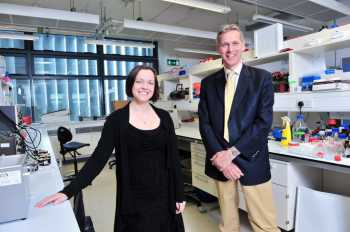28 May Bill & Melinda Gates Foundation To Support Study of Microbiome of Infants in Developing Countries
MedicalResearch.com Interview with:

Jennifer Mahony, PhD and Prof Douwe Van Sinderen
Jennifer Mahony, PhD and
Prof Douwe Van Sinderen
Dept of Microbiology
University College Cork
Cork, Ireland
MedicalResearch.com Editor’s note: Dr Jennifer Mahony & Prof Douwe van Sinderen, of the APC (Alimentary Pharmbiotic Center) Microbiome Institute, University College Cork, Ireland, have received a Grand Challenges Explorations Grant from the Bill & Melinda Gates Foundation to study the microbiota (bacteria and viruses) of infants in developing countries. This study seeks to improve the gut health of infants which could potentially prevent/reduce the estimated 0.8 million infants who die annually in developing countries.
Dr. Mahony & Prof. van Sinderen answered several questions about the upcoming study for the MedicalResearch.com audience.
MedicalResearch.com: What is the background for this study? Would you briefly explain what is meant by a microbiome?
Response: The World Health Organisation promotes exclusive breast-feeding in infants until they are at least 6 months old. Early weaning in developing countries where sanitary conditions may be poor may lead to the introduction of microorganisms such as Shigella, which can cause intestinal infections and in extreme cases may be fatal. 0.8 million infant deaths in developing countries could be avoided annually according to UNICEF if exclusive breast-feeding is continued to the sixth month of life. Our intestinal tracts naturally contain many bacteria, called our microbiota, and the composition of this microbiota may have implications for our health and well-being. Just in the same way that drinking a probiotic drink every day is reported to promote a healthy gut microbiota, we will investigate how bacterial viruses (that specifically infect bacteria and not humans!) can change the gut bacterial population.
MedicalResearch.com: What are bacteriophages? How might they affect the balance of good and bad bacteria in the intestine?
Response: Bacteriophages (or phages) are bacterial viruses that specifically infect bacteria. By having phages in our systems that may infect the bad bacteria in our intestines, it is expected that this would reduce the numbers of bad bacteria and allow the good bacteria to dominate in our gut, promoting good health. So we will look at the presence of good and bad bacteria in infant stool samples and relate it to the presence or absence of phages that might infect these bacteria to see how these phages alter the bacterial diversity in the infant gut.
MedicalResearch.com: What do you hope to learn from this project?
Response: We aim to look at the role that phages play in affecting the balance of good and bad bacteria in the infant gut and also to find phages that specifically target bad bacteria that may be used as a therapy as a cheap and accessible alternative to antibiotics. By isolating bacterial viruses that specifically infect the “bad bacteria” we hope to encourage the growth of health promoting bacteria. Ultimately this will enable us to develop essential tools to promote health, combat infections and help to prevent needless infant deaths in developing countries as all children’s lives are equally invaluable irrespective of geography.
MedicalResearch.com: Thank you for your contribution to the MedicalResearch.com community.
Citation:
Note: Content is Not intended as medical advice. Please consult your health care provider regarding your specific medical condition and questions.
More Medical Research Interviews on MedicalResearch.com.
[wysija_form id=”5″]
Last Updated on May 28, 2016 by Marie Benz MD FAAD
